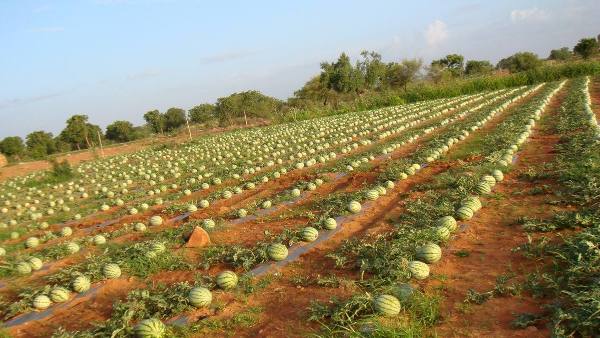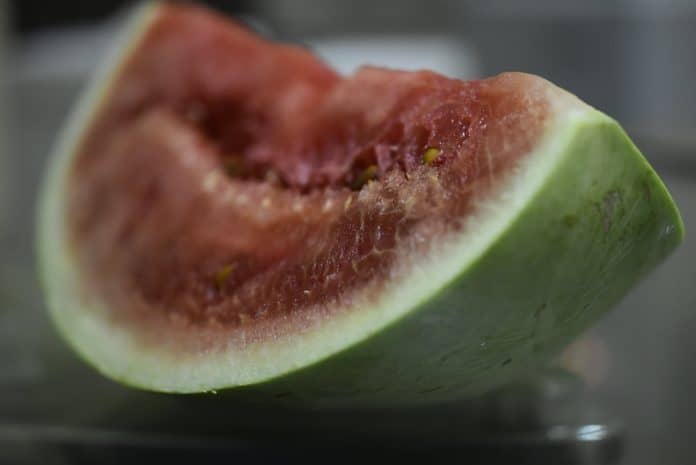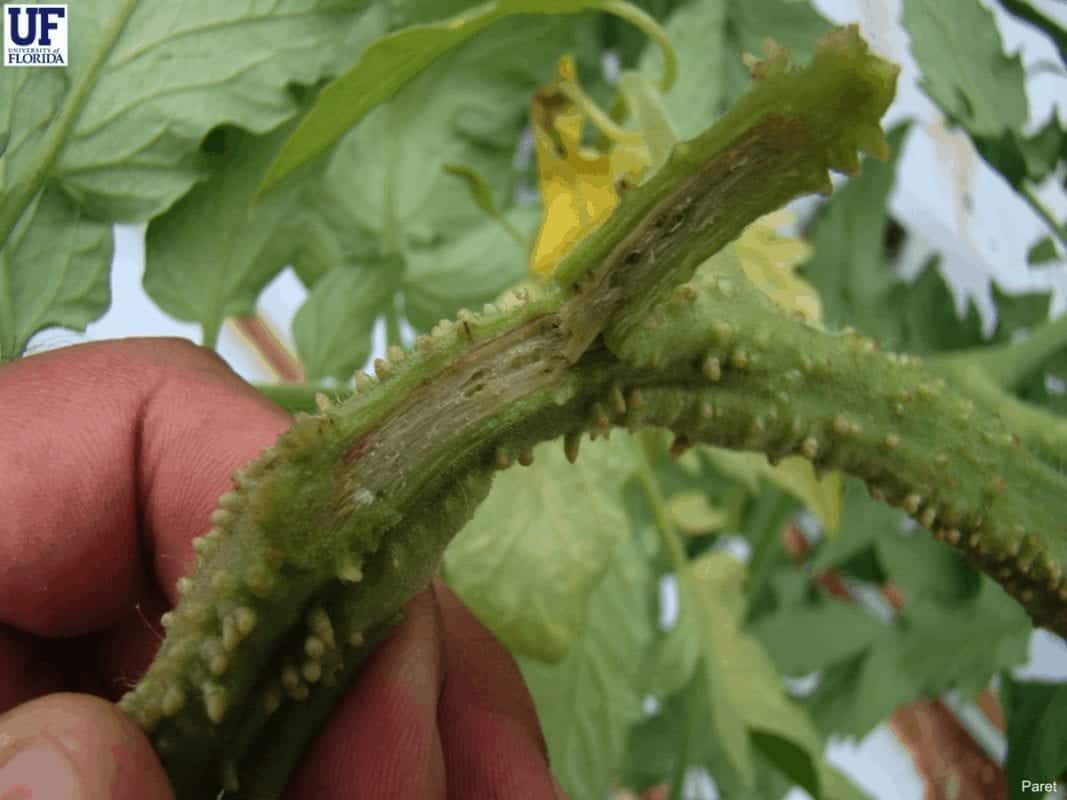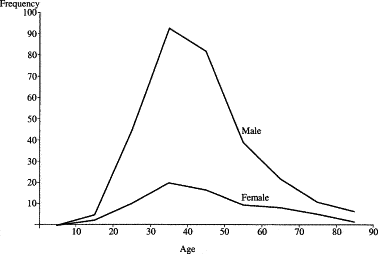Watermelon farming business is one of the most lucrative agribusinesses any farmer might engage in. In Nigeria, this is particularly true because of its high demand and return on investment. It is one of the fast-selling agricultural products in the local markets. Presently, asides potatoes and tomatoes, Watermelon is the third most cultivated crop in the world. The fruit is widely eaten across Nigeria and it is also exported in large quantities.
So follow the guides below If you have the intention of starting a watermelon farm.
Contents
Watermelon Farming Process
Watermelon farming involves four significant steps –
- Seeds selection and preparation
- Land Preparation
- Irrigation
- Fertilization
- Harvest
Watermelon is a short-term farming product that spans the duration of 65-90 days; it requires a clear land plantation with no trees, shrubs, or any tall plants or weeds that could obstruct its access to sunlight. A solid pH level and temperature of 6 to 6.8 and 70°-90° F respectively are needed for optimum yield.
- Watermelon Farming Process
- Land Requirement and Preparation
- Seed Preparation For Watermelon Farming
- Watermelon Seed Sowing
- Planting Watermelon
- Weeding And Fertilizer Application
- Harvest
- Post-Harvest and Value Addition
- Reasons To Invest In Watermelon Farming in Nigeria
- Watermelon Business Analysis
- Investments and Returns (ROI) Analysis
- Calculations For Returns On Investment
- Factors That Affect Successful Watermelon Farming.
- Lack of Capital
- Market Knowledge
- Transportation Network
- Mechanized Tools
- Labour Efficiency
- Weather Condition
- HEALTH BENEFITS OF WATERMELON
- 1. Watermelon Helps Hydration
- 2. Watermelon Helps Reduce Inflammation
- 3. Watermelon Can Improve Digestion
- 4. Watermelon Keeps the Heart Healthy
- 5. Watermelon Can Helps Combat Cancer
- 6. Watermelon Controls Blood Pressure
- 7. Watermelon Help Relieve Muscle Soreness
- 8. Watermelon Healthy for Skin and Hair
- 9. It Aids Post-Workout Recovery
- 10. It Enhances Sexual Performance
- Watermelon FAQ
The high demand for Watermelon is an opportunity you can leverage to increase your income if you are an agriculture enthusiast.
Land Requirement and Preparation

Land preparation for watermelon farming starts with cutting, tilling, and plowing the soil, which could be divided into beds or ridges for proper soil aeration and to give room for perfect root formation.
Watermelon thrives on silt loam and loamy soil, soil with low water-retention abilities considering that the fruit doesn’t thrive in waterlogged lands. However, if you must plant it in waterlogged ground, you must improve drainage with ridging to reduce the land’s ability to retain water.
A hectare (2 and a half acres) of farmland after land preparation by plowing and tilling the land would accommodate an average plant count of about 10,000 – 12,000 watermelon plants depending on the plant spacing.
Although Watermelon would most likely grow in any soil type, it does very well in slightly acidic soil with pH in the range of 5.8-7pH level. In the same vein, it needs a soil composition that is loamy with an excellent sandy component, which would aid natural drainage for the seed to thrive well and grow without stress.
If you have no other option but to cultivate on soil with high clay content, then make beds or ridges and plant the seed on them. Following the steps below will help.
- First, clear the land and burn sticks and grasses after removing them. However, burying the grasses can serve dual purposes – get rid of them and turn them into manure. Till the land when you are ready for planting to ease water penetration and make germination more comfortable.
- Some bacteria and predators such as termite are destructive. Get rid of them before planting by treating the land with pesticides or insecticides. In the absence of manure, apply inorganic fertilizer to boost the land’s fertility before planting.
Seed Preparation For Watermelon Farming
The success of any Agribusiness has a lot to do with the seeds used in the process of pre-production, aside from generally putting in place all other acceptable Agricultural Practices such as pesticides, fertilizers, weather conditions, among others.
It is a good idea to treat your seeds in fungicides and pesticides to protect the seeds against pest and nematode diseases in the soil. For organic means of seed preparation, you can put the seeds in a mix of any organic oil such as castor oil, olive oil, or neem oil with ashes before planting into the soil. Better still, ensure that you purchase only treated seeds.
However, there are various seed producers and varieties of watermelon seeds in Nigeria. Each seed variety has particular qualities they are known for, an example of good watermelon seeds is Congo f1, crimson, black diamond, and the likes are seeds produced by company brands like Premier seed, East-West, Technisem, etc.
Watermelon Seed Sowing
A sachet of 600-1.5kg of seed would almost likely cover a hectare of land using a near-perfect spacing of seedbed of 5-15cm high and 1m wide. The seedbed is covered in a potting mix ( a mixture of manure, sawdust, and ashes) to loosen the soil and also aid the speedy germination of the seedlings.
The watermelon seedling is vulnerable in the first week of germination, so it is crucial to cover the seedbed with mulching film to wade away pest, disease infestation, and also heavy rain.
Watermelon seed should be planted 30cm deep into the soil, observing a row spacing of about 2metres apart while maintaining 1 meter apart in between the plant. Under a good agricultural practice, a seed of watermelon plant would produce a minimum of one big plat by harvest time and in rare cases, there could be an occurrence of more than one plat.
| BRAND | SEED NAME |
|---|---|
| Technisem | Heracles F1, Congo F1 |
| Premier seed | Crimson, Sugar queen / baby |
| Eastwest seed | CAOLAK, CHARLSTON GREY Black Diamond, Heirloom, El-Ghali |
Planting Watermelon
A hectare (2 and a half acres) of farmland after land preparation by plowing and tilling the land would accommodate an average plant count of about 10,000 – 12,000 watermelon plants depending on the plant spacing.
Plant spacing of 1m between plants and 2m between rows would give a total of 10,000 watermelon plants, which is recommended according to NIHORT research carried out for optimum output.
Planting stage should include a step of spraying pre-emergence herbicides 4-5days after planting the watermelon seeds to kill weeds and reduce the weeding time to a maximum of 1 or 2 times.
It takes 6-7 days for the Watermelon seeds to germinate.
Weeding And Fertilizer Application
After planting, the next stage is the application of fertilizer and spraying the farm with insecticides on the 10th-12th day to reduce the infestation of pests or diseases as the plant is very vulnerable and susceptible to pest and disease attack at this stage.
Also, at this point, you should be on the lookout for seeds that did not germinate and replace them to give a perfect output at the end of harvest, as earlier stated.
On the 30-35th day, when the watermelon vine has started flowering, another light weeding should be carried out while applying NPK 15,15,15 fertilizer or UREA to the plant. It is also at this time that the second insecticide is sparingly applied to reduce the damage by insects.
Harvest
Apply the last batch of insecticides on the 60th day to keep away insects from destroying the watermelon fruit as they are well-formed and getting close to harvest.
Some of the pest, insects, and diseases to watch out for include but not limited to:
PEST: Bugs, Beetles, and Rodents TREATMENT: Spray Insecticides on recommendation from an Agro store
DISEASE: Fusarium wilt Anthracnose TREATMENT: Uproot and burn infected stand or plant
From on the 75th day to 85th day, the watermelon fruit should be getting ready for proper harvest and moved straight to the market.
Post-Harvest and Value Addition
Care should be paid to handling the watermelon fruits from harvest to the point of sales. The fragile fruits could be damaged or bruised if not carefully handled, and that could spell the difference in value and a corresponding profit or loss.
In addition, final consumer products such as watermelon juice, watermelon syrup, watermelon flavours for cooking and baking are other final products that would make an investor smile to the bank at the end of the season.
Reasons To Invest In Watermelon Farming in Nigeria
Watermelon farming is a very profitable and lucrative agribusiness to invest in this part of the world. However, it is capital intensive and would consume a lot of time to achieve results, but trust me, Watermelon is consumed by the larger population in Nigeria.
• It is very profitable
• It is very lucrative
• It is very marketable
• It has a lot of health and medical benefits
• It is very easy to start.
• Short term return on investment
Watermelon Business Analysis
This short analysis shows the profitability of watermelon farming when proper agricultural practices are put in place to get the best output. But it is best that a major interest is put into marketing as soon as the fruit starts germinating on the farm, a failure to do so could deplete the profit margin to some percentage which may not be favorable to the farmer or the investor.
Investments and Returns (ROI) Analysis
According to National Institute of Horticulture (NIHORT), the research they conducted in 2019 revealed that planting Watermelon on one hectare of land would yield an average minimum of about 10,000 watermelon fruits and to achieve this an average investment of about #280,000 – #300,000
#280,000 as at the time of report compilation the breakdown is as stated below
| Item | Cost (N : K) |
|---|---|
| Land clearing, plowing, harrowing mechanically | 50,000 |
| Improved seeds | 30,000 |
| Planting and weeding labour | 70,000 |
| Fertilizers (4bags) and application labour | 40,000 |
| Insecticides and application labour | 40,000 |
| Sprayer | 20,000 |
| Other expenses and Miscellaneous | 30,000 |
| Total Expense Made | 280,000 |
Calculations For Returns On Investment
According to the research by NIHORT at the point of the harvest, a total of 10,000 watermelon fruits are expected on our land. An offtake of the harvest would go for a minimum of N200 per fruit.

10,000 fruits * #200 per fruit = #2,000,000 at the minimum possible.
RETURNS ON INVESTMENT
Profit = Returns – Cost of production
= #2,000,000 – #280,000
MINIMUM RETURN ON INVESTMENT ON OUR SAMPLE FARM = # 1,720,000
When this return on investment is considered with the initial investment made and the time duration for which the watermelon fruit takes from land preparation to the time it gets to the market. Then it stands to say that Watermelon is a highly lucrative farm product.
Factors That Affect Successful Watermelon Farming.
There are lots of factors that affect the production of Watermelon in Nigeria, just like many other farming businesses in the country. Some of the significant factors, though common to other businesses, but mainly affect farming as a business.
Lack of Capital
This is a major factor that determines the success of any agribusiness. And in the case of watermelon production that requires a vast expanse of land for commercial farming, capital plays a major role.
Other capital dependent factors are:
- The best of seeds
- Proper farm equipment
- Labour costs,
- Fertilizers
- Insecticides.
While for small scale, watermelon farming is not all that capital intensive, but the level of capital required depends more on the scale of production.
Market Knowledge
A vital point worthy of note is the advice to all intending watermelon farmers to understand the dynamics of the market as it is the second most crucial factor that determines the success or failure of watermelon farming and a farmer’s approach to the market.
Transportation Network
There is still a milestone of a hurdle to be won when it comes to road network connecting the urban where the market is, to the rural where the majority of the market is being done due to the bad road linkages.
Watermelon fruit is delicate and you should avoid damaging it, transportation. Due to the bad road networks in most rural areas where it is mostly cultivated, farmers lose a significant number during transit.
Mechanized Tools
To successfully dominate the market as a watermelon producer in a country like Nigeria, you need to adopt the system of mechanized farming.
The use of mechanized tools such as tractor, plough, harvester, Knap Sack Sprayer, etc., in the ploughing, tilling, preparation of soil, fertilization, and harvesting of Watermelon is essential to achieve optimum outputs.
But in this present-day farming, the crude level of farming tools is a serious bane to the production of most agricultural output, so to produce to scale in commercial levels you need tools beyond manpower.
Labour Efficiency
Farm labour availability has been on the continuous decrease due to migration of the able-bodied youth from the rural areas where farming is a dominant culture to the urban areas.
This migration emanates from reasons such as looking for a better lifestyle, a move that results in only the old and aged people on the farm community.
The aged people left on the farm have minimal production capability left in them, their capacity is substantially reduced, and their efficiency on the farm is minimal.
The scenario painted above results in nothing but low farm produces, season after season.
Farm output is proportional to labour efficiency on the farm – the higher the efficiency, the better the production on the farm, and the lower it is, the lower the output on the farm. On this note, it is essential to have labour that is committed to the farm output by being efficient in their line of duty.
Weather Condition
Watermelon requires an optimum amount of water hence the reason for planting it at the offset of rainfall or earlier than the commencement of the rains. The recent erratic nature of rainfall is of significant concern that needs to be put into consideration before starting a watermelon farm.
A major reason that makes Watermelon so susceptible to weather is its root structure. It is very shallow rooted that water or rainfall would make the plant even more vulnerable to pests and diseases.
HEALTH BENEFITS OF WATERMELON
There are tons of health benefits associated with Watermelon as a fruit and as a seed. Watermelon is loaded with lots of vitality such as potassium, iron, magnesium, folic acid, vitamin B, A, and C.
Watermelon also contains an antioxidant property that helps fight off infections and protect the skin from ultraviolet rays. The Lycopene content in Watermelon can help reduce cancer risk.
Watermelon is also linked to the prevention of heart-related conditions as well as correcting metabolic deficiencies. Watermelons contain phytonutrients that have excellent effects on the health and proper functioning of internal organs, eyes, and the secretion system.
However, Watermelon seeds are a well rich source of proteins, vitamins, omega3, and omega6 fatty acids, magnesium, zinc, copper, potassium, and are high in calories.
1. Watermelon Helps Hydration
Watermelon is effective in reducing both body temperature and blood pressure due to the percentage of water contained in the fruit, which is about 92 percent. It is known to help fight dehydration during hot weather and protect the body from heat stroke.
The high amount of water in watermelons also helps to stimulate the release of excess liquid in the form of sweat in the body. According to Healthline, Watermelon helps with overall hydration, and that is a great thing.
2. Watermelon Helps Reduce Inflammation
Watermelon is known to contain anti-inflammatory properties that help fight off inflammation and lower oxidative damage in the body due to its antioxidants, lycopene, and vitamin C content found in the fruit. Watermelon also neutralizes free radicals, boost the immune system and mental health while fighting off infections and bacterial in the body.
3. Watermelon Can Improve Digestion
Watermelon contains a tremendous amount of water, fiber-rich fruit, and vegetables, which enhance a healthy digestive system, prevent constipation, and help the body boost the immune system.
Watermelon is known to help promote healthy bowel movements. The fiber in Watermelon can provide a bulk of stool while the water in it helps keep the body moving efficiently.
4. Watermelon Keeps the Heart Healthy
While watermelon isn’t the only fruit that contains lycopene – it is the red pigment responsible for the red color in most fruits, the National Watermelon Promotion Board reported that watermelon has high lycopene levels. According to scientists quoted by the Board, a 2-cup serving of the fruit contains between 15 and 20 milligrams of lycopene.
The United States Department of Agriculture reported that “Scientists have found that lycopene in the diet correlates with reduced incidence of certain types of cancer. And lycopene levels in fat tissue—an indicator of lycopene consumption—have been linked with reduced risk of myocardial infarction (heart attack)”
The high levels of lycopene found in Watermelon are very effective in protecting the cells tissue from damage, and it can help lower the risk of heart disease. Watermelon extracts can also help reduce hypertension, lower blood pressure, and fight obesity in older adults.
Having a slice of Watermelon every day, according to research, can halt the accumulation of bad cholesterol in the body and fewer fatty deposits inside the blood vessels. Studies have also revealed that Watermelon can fight menopause in women if they can take watermelon extracts for six months and can help improve blood flow and may help reduce the accumulation of excess fat.
5. Watermelon Can Helps Combat Cancer
Lycopene, as the primary compound found in watermelons, has also been found to reduce the extent of cancer insurgence, fight free radicals, and protect against any form of infection. According to the study carried out by Chicago, lycopene exhibits chemopreventive properties that work better in prostate cancer cells.
Lycopene has also been found useful in the treatment of Human Papillomavirus (HPV) infection, which might lead to uterine cancer if not well correctly taking care of. However, the powerful antioxidants in Watermelon prevent certain diseases in the body.
6. Watermelon Controls Blood Pressure
As the most abundant source of natural citrulline, Watermelon helps the body to maintain healthy blood pressure. Watermelon is also a good source of potassium/electrolyte. This nutrient helps releases the tension on blood vessels and arteries, thereby stimulating blood flow and reducing the stress on the cardiovascular system. i.e., it regulates high blood pressure during physical exercise or workout.
Watermelon extract plays a significant role in lowering blood pressure in people suffering from hypertension. It as well prevents the chance of blood pressure, blood clots, strokes, heart attacks, and atherosclerosis.
7. Watermelon Help Relieve Muscle Soreness
Amino acid citrulline contained in Watermelon can help soothe sore muscles and help reduce muscle fatigue after a heavy workout or exercise. Drinking watermelon juice can also help your muscles receive more oxygen and recover faster from exercise endurance and performance. Citrulline has been found to accelerate the process of lactic acid removal, thereby relieving muscle soreness. Studies have shown that citrulline absorption is most effective when it is consumed as a component of watermelon juice.
8. Watermelon Healthy for Skin and Hair
The nutrients found in Watermelon are good for the skin and hair. They protect the skin against sunburn while keeping the skin supple. Vitamin A and C present in Watermelon can help the body make collagen, a protein that keeps the hair healthy and glowing. Watermelon, over the years, has been recounted to help the body create and repair skin cells.
The lycopene and beta-carotene may also help protect your skin from sunburn because, without adequate vitamin A derived from Watermelon, the skin may look dry and flaky.
9. It Aids Post-Workout Recovery
During workouts, you exercise your muscles and lose a great deal of glycogen in the process. One of the most effective ways to replenish the lost glycogen is to consume Watermelon. If the words of the founder of Isabel Smith Nutrition, Isabel Smith, are anything to go by, “Watermelon has useable carbs, plus magnesium and the amino acid L-citrulline, which is involved in healing and exercise recovery.”
10. It Enhances Sexual Performance
A group of researchers at Texas A & M University conducted some studies to find the correlation between libido and Watermelon. The result of their studies published in Science Daily reveals that Watermelon can have a Viagra-like effect on consumers.
These are some selected benefits of this amazing fruit from its long list of health benefits. They are reasons why the fruit has become a regular in many homes worldwide.
The growing demand for Watermelon globally has necessitated the need for more agriculture-inclined individuals to consider watermelon farming. How can you do that successfully and create a steady source of income while contributing your little quota to a healthier society?
Watermelon FAQ
How long does watermelon take to grow?
On average, with the right conditions in place, it takes between 65 and 90 days after planting for Watermelon to reach maturity and ready for harvest.
What are the common diseases of Watermelon that a farmer should look out for?
Watermelons are highly susceptible to several diseases. Mostly, these diseases attack the roots, foliage, and fruit. Mostly these diseases are caused by Fungi. Luckily, most of these diseases can be avoided by planting treated seeds. Some of the common diseases are:
1. Anthracnose. Anthracnose is a very common fungal disease and is caused by the seed-borne fungus Colletotrichum lagenarium
2. Root-Knot Nematode
3. Fusarium Wilt
4. Gummy Stem Blight
5. Downy Mildew
What is the best control for Watermelon Diseases
Watermelon diseases are mostly either Fungi or Virus diseases. They are therefore highly destructive as they spread very fast. The best control is to buy treated seeds. Other strategies are the use of insecticides, and herbicides to control the disease vectors.
Is Watermelon Farming Lucrative
Watermelon is a highly sought after fruit. Demand is high and it is very lucrative. Check the section under ROI above.

























Great.
Awesome
I never knew water melon plantation is as easy and more rewarding as this. The farmers doing that in Nigeria should be billionaires by now because I don’t see many doing it. I have not even seen a farm that grows water melon. This should be an not cake in the agricultural sector. Thanks for the insights.
Lol… Well, nothing is particularly easy to do.
Yes, agriculture is highly rewarding and to make it particularly profitable, there must be the right policies from the government to make it worthwhile. Nigeria seems to be waking up to that fact and I believe that we will get there soon.
Have you ever considered creating an e-book or guest authoring on other websites?
I have a blog based on the same information you discuss and would really like to have you share some stories/information. I know my readers
would enjoy your work. If you are even remotely interested, feel free to shoot me an email.
Very good article! We will be linking to this particularly great article on our site.
Keep up the good writing.